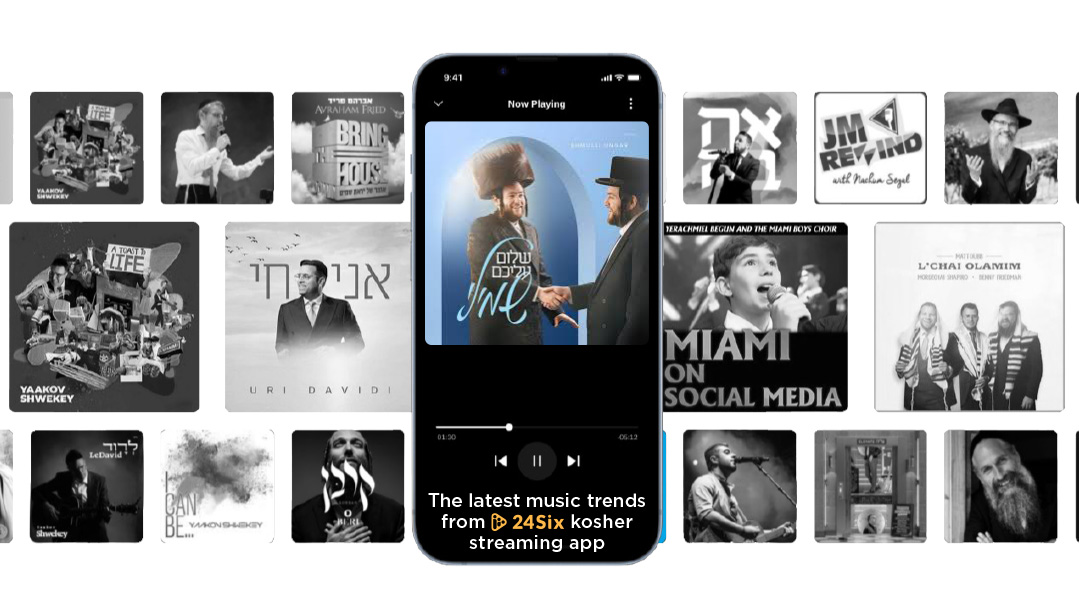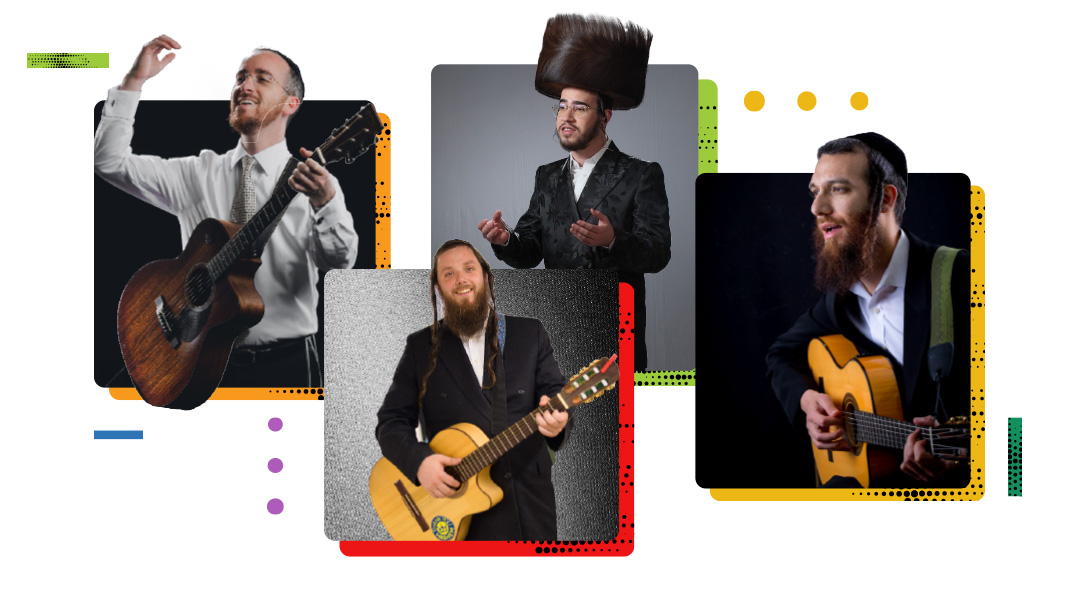Streamlined
| May 7, 2024The latest music trends from 24six kosher streaming app

Shmueli Ungar is excited to see his new album, Shulem Aleichem, and specifically the song “Fire,” climbing the charts and trending on 24Six, becoming the top song of the past few weeks. For Shmueli himself, music streaming is a welcome development which has eased and unravelled the highly-charged area of music piracy.
“Streaming is slowly dissolving the stigma on copying music and solving the financial debate. It provides steady income for artists while offering convenience for music consumers,” he says.
In the 1990s and early 2000s, music artists and producers made profits from selling CDs, with best-selling albums netting tens of thousands of sales. But starting around 2008, the digital revolution changed the game. Music that was available on online channels could be freely copied. Shmueli, who released his debut album in 2016, acknowledges that since he started out after copying music online was a given in his new profession, the issue never really became personal.
“Obviously, I don’t endorse stealing music, but I have no grievances, because I never took it for granted that I’d profit from album sales,” he says. “I used my singles and albums to generate demand for live performances. Even if people copied my music to listen, I was still getting out there, one way or another. I also don’t believe that people suddenly became willful ganavim — I think that the ease and convenience simply won them over. Now, with streaming, everybody wins. Artists get paid an incentive by 24Six to upload their music there, and in the long term, if people are listening, you can cover the expense of producing an album and even make a little money.”
24Six, he notes, is absolutely transparent and honest, and the company pays monthly.
“Earnings obviously go up and down, and will be more substantial after an album release. But they continue as long as your music is on there, and dividends even go to the families of music artists who have passed on. Yiddishe kinder don’t want to steal, they just want to consume music with convenience, and as long as you make it convenient, they will subscribe.”
While 24Six is a kosher alternative to other streaming platforms that families don’t want in their homes and even offers individual halachic filters for kol ishah and other content, not everyone is online; there’s a corner of the market who are not listening online, and they are also a part of the audience. For them, Lechaim Music takes care of printing USBs and distributing.
Another new release gathering thousands of streams on the platform is the new album Mamish at the End by MENDY WORCH and the Thank You Hashem Studios, especially its hit song, “Chi Chi Wa Wa.” But Mendy says that while listeners might enjoy the fun song and find it sticking in their minds, they’re not all that clear about its meaning — which might actually be part of the group’s intention in building up the curiosity and intrigue.
“What’s behind it is related to a message that Rabbi Yossi Zakutinsky, Rav of K’hal Mevakshei Hashem in Lawrence, shared in one of his derashos in explaining what Chazal say about two ways of looking at the yetzer hara. He said that the challenges it throws our way can seem big, scary, and intimidating, or they can be viewed as just a tiny, annoying Chihuahua. If a Chihuahua barks at you, you don’t feel intimidated because of its small size. You’d just kick it away and keep on going, or as Chazal say, schlep it along with you to the beis medrash. So the song is about that Chihuahua that you’re not afraid of.”
Mamish at the End resonates with so many people who feel the desperation of the galus we’re living through. “When I was growing up, every other song was about Mashiach,” Mendy says, “but the music messaging has moved in a different direction. Obviously, we are only getting closer to the time, and people want to get into that mindset. Sitting together with the Thank You Hashem chevreh, we spoke about the feeling of Ikvesa D’Meshicha, and we realized people wanted to sing about that feeling. We can only daven that this galus is mamash at the end, and a start to a whole new world where we are closer to each other and to Hashem.”
Back to Life
With the challenge of juggling family time with a singing career paramount for wedding performers, SIMCHA LEINER has found a way to keep another one of the balls in the air — he tries to do hospital visits while he travels for singing gigs.
“I don’t want to run out on my kids more than I have to,” he says, “so when I’m home, I try not to do many hospital visits. Instead, when I’m traveling anyway, singing at a function in another city, I’ll take the opportunity and arrange to visit a medical center there to sing for patients.”
A while back, Simcha was driving to an event out of town, and had left extra time so he’d arrive early. En route, he got a call asking him to make a stop at a hospital in North Jersey. The caller said his friend had been hit by a car and been in a coma for weeks. When he arrived and found the patient’s room, Simcha realized the music would have to be pretty quiet. “It wasn’t a family or recreation room, but a hospital room with other patients, which meant we could only sing songs quietly, no music, no speakers.”
But he began to sing, and as the niggunim came to life in the room, he realized the patient was moving. “It was wild. We literally saw him stirring, the beginning of his recovery. A few days after that visit, his friend sent me a video of him speaking, thanking me for coming. Unbelievable.”
The Power of a Blessing
ARI GOLDWAG describes himself as “very litvish, not someone who usually runs around to rebbes and tzaddikim.” But when he heard from some friends about the power of prayer they had witnessed from the young tzaddik Rav Shlomo Yehuda Beeri of Rishon L’Tzion, known as the “Yanukah,” he decided to go along and request a brachah.
“It was a long wait, a few hours,” he recalls, “but I got my brachah. Then I stood around to watch a little, and I saw how the Yanukah interacts with streams of people, in a very warm and loving way.” Rav Beeri’s gabbai recognized Ari as a popular singer and songwriter, and as the Rav himself plays music, the gabbai informed him who the guest was.
“After the Rav gave me that brachah, a spate of new songs came to me. It was like a wave of inspiration — I’d go to the hills near Beit Shemesh with my guitar and come up with new music each time,” Ari says.
The song “B’Yerushalayim,” with its upbeat reassurance, stood out for him right away. When Ari heard that Rav Beeri was making a big siyum, he went along with his guitar and sang the new song. The Yanukah appreciated the niggun and his encouragement led to its release as a single.
Songs that Give Me Chizuk
“In Yomtov Ehrlich’s famous Yiddish song ‘Yakob,’ there is a line where Yakob is being offered a match with the landowner’s daughter, and he says, “Ich bin a Yid, ich ken es nisht tun, mein Torah erloibt mir nisht — I am a Jew, I can’t do it; my Torah doesn’t allow me to marry a wife who doesn’t believe as I do.’ In that time and place, the match meant riches and security, but Yakob was so firm — he couldn’t do it because the Torah didn’t allow it. I love that clarity, and whenever I sing this song, even with my kids at home, I get overwhelmed with emotion by those simple, direct words.”
—Moshy Kraus
(Originally featured in Mishpacha, Issue 1010)
Oops! We could not locate your form.







